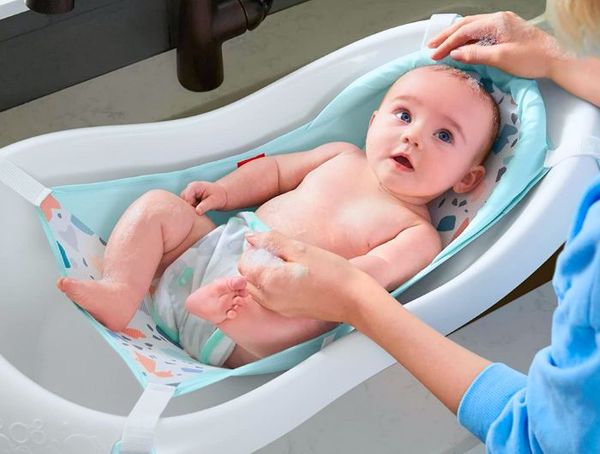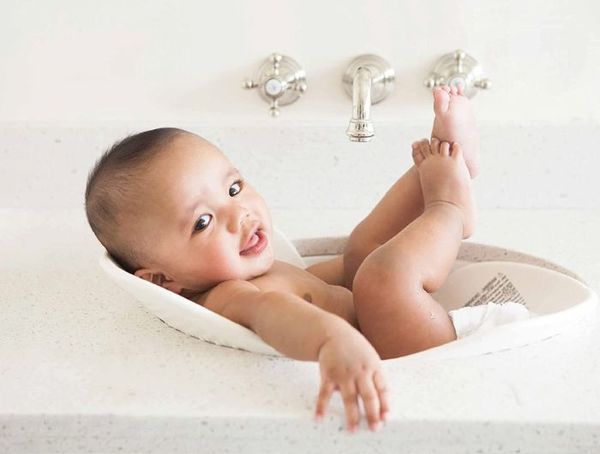Bathing your baby plays an essential role in their hygiene and overall health. But as a new parent, you may wonder about how often you should bathe your baby. This post aims to answer your questions about baby's bath time and provide you with some baby bathing basics to ensure that you can bathe your little one with ease.
When Should You Give Your Baby Their First Bath?
Most hospitals give newborn bath or sponge bath after delivery. Although new parents can give their newborn baby sponge baths as early as they like, doctors recommend waiting until their baby's umbilical cord stump falls off.
You can give a sponge bath to your baby using a sponge or washcloth while avoiding the umbilical cord stump. After the stump falls off, you can give them a regular bath using a special baby bathing tub.
When Should I Bathe My Baby For The First Time?
You may be eager to give your baby their first bath in their great baby bathing tub as soon as you bring them home from the hospital. However, it's better to wait until their umbilical cord stump falls off and heals completely.
This usually happens within one to four weeks after birth. Until then, you can give your baby sponge baths to keep them clean and comfortable.
How Often Should You Bathe Your Baby?
Many new parents often overthink how often they should bathe their baby. But remember, babies are not like adults.
Their skin is incredibly delicate and sensitive, and frequent bathing can dry out their skin and make it more susceptible to allergies and infections.
The American Academy of Pediatrics recommends you should bathe babies up to three times a week in their first year of life. This recommendation is good enough to keep your baby clean and healthy without drying out their skin.
However, bathe your baby more often when they get dirty, sweaty, or have baby skin irritation or baby rashes. Make sure to keep your baby's bathing routine even when you are traveling with a travel-friendly baby bathtub.
Why Should You Not Bathe Your Baby Every Day?
Premature Skin Dryness
Bathing your baby every day can strip their skin of their natural oils, causing the skin to become dry and itchy, especially for babies with sensitive skin.
When your baby's skin dries up, it can lead to other skin issues such as eczema, rashes, or infection. Therefore, it is advisable to limit their bath time to only three times a week.
Bathing Can Be Stressful
Bathing can be distressing for babies, especially when you bathe them in the middle of other activities. It disrupts their routine, and they may get upset when you take them out of the bath, especially if they're not adequately dry.
It can frustrate for both the baby and the caregiver, so it’s best to stick to a schedule that works for both.
Baby's Skin differs from Yours
Unlike adult skin, a baby's skin is new and extra-soft. So, it can be sensitive and easily irritated.
Therefore, exposing it to products such as baby soaps, shampoos, and bubble baths every day can cause discomfort to the baby and lead to skin irritation or other health complications.
Tips for Giving Your Baby a Bath
Use gentle baby soap for baby's skin
Select a baby wash or soap designed specifically for a baby's sensitive skin. Choose products that are free from harmful chemicals and fragrance-free.
Fill the Baby Bath with Warm but not Hot Water
Babies cannot tolerate high temperatures, so make sure the water is warm and not too hot for your baby's delicate skin. Dip your elbow or a thermometer in the water to check if the temperature is suitable enough. Aim for bath water around 100°F (38°C).
To keep your baby warm, only uncover the parts of their body that require washing.
Start by Washing Your Baby's Head
Begin by wetting their head and add a small amount of a mild baby soap. Use a damp washcloth or sponge to clean their scalp, then rinse with water.
Wiping Baby's Body
After washing their head, move on to their body, including legs, arms, and torso. Again, use a washcloth or sponge with gentle baby soap to clean your baby's body, then rinse with water.
You should also check their skin folds (such as under the chin, behind the ears, and in the armpits) for dirt or moisture and wipe them gently.
Rinse Your Baby Thoroughly
Now that you have washed your baby's body, rinse them with fresh water to remove any soap residue entirely.
Pat Your Baby Dry
Gently pat your baby with a soft towel to dry them off. Dress them in a clean diaper and clean clothes.
How to Keep Your Baby Clean Between Baths
There are some areas of your baby's body that need special attention and care to prevent infections and rashes.
Clean Their Face And Neck Regularly
Babies tend to spit up, drool, and sneeze a lot, which can make their face and neck messy and sticky. You should wipe down their face with a soft cloth or a cotton ball dipped in warm water at least once a day.
Be gentle and avoid rubbing too hard. Don't forget to lift their chin and clean under the folds of their neck, where milk and saliva can accumulate and cause irritation.
Keep Their Genitals And Bottom Clean
Whether you use disposable or cloth diapers, change them frequently and clean your baby's genitals and bottom thoroughly with each change.
For boys, if they are not circumcised, you should gently retract the foreskin and wipe around the penis with a moist cloth or a baby wipe.
For girls, wipe from front to back and clean the folds around the vagina. You should also check for any signs of diaper rash and apply a barrier cream if needed.
Moisturize Their Skin After Cleaning
After you have cleaned your baby's face, neck, genitals, and bottom, apply a mild lotion or oil to moisturize their skin and prevent dryness.
Choose a product that is hypoallergenic and fragrance-free, and avoid using too much. Massage the lotion or oil gently into your baby's skin with your fingertips.
Conclusion
Baby baths are an essential part of your baby's hygiene, it’s crucial to remember that their skin is more delicate than yours.
Remember to limit bathing to three times a week, avoid using harsh products, and opt for other bathing alternatives to help keep your baby clean, happy, and healthy.
Use mild baby soap and avoid frequent bathing, so as not to dry out your baby's skin. With these tips in mind, you can confidently bathe your baby and enjoy the many benefits of baby bath time.
If you have questions about your baby's hygiene, consult your pediatrician or nurse.
Thank you for reading Mother Bear Reviews, your favorite parenting blog!





